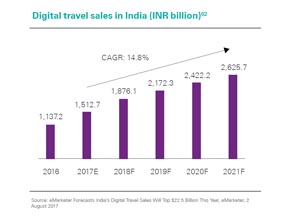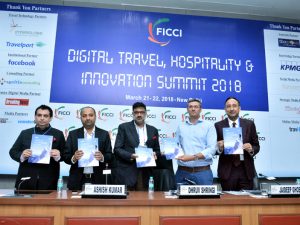The online sales of travel booking is likely to increase at a CAGR of 14.8 per cent during 2017–21, according to FICCI and KPMG India’s latest knowledge paper titled ‘Expedition 3.0- Travel & Hospitality Gone Digital’. This uprising of digital travel in India can be attributed to the increasingly digitally savvy Indian travellers. In 2017, India was projected to have accounted for 3.7 per cent of the global digital travel sales — making it the third-largest market by value in the Asia-Pacific (APAC) region. The Indian government’s move to remove high currency notes out of circulation in November 2016 is expected to have further catalysed the growth of digital travel sales in the country 2017. The most significant reform in travel has been brought by mobile applications, which have enabled the whole user experience to be available on-the-go. These include usage of mobile tickets/boarding pass, mobile check-in for hotel rooms, cab hailing applications, and even cloud passports in some countries — in addition to the basic features such as search, booking, payment, invoicing and customer support.
Read More »FICCI-KPMG Knowledge Paper to focus on tech-savvy Indian traveller
FICCI and KPMG India have jointly unveiled the knowledge paper ‘Expedition 3.0- Travel & Hospitality Gone Digital’ at the inaugural session of Digital Travel, Hospitality & Innovation Summit. The Knowledge Paper looks at unravelling the technology trends in travel and hospitality segment that will help better define the future of the industry, how digitalisation has impacted the evolution of this industry and what can be achieved by overall technology inclusion across stakeholders in the industry ecosystem. Some of the key highlights of the paper reveal that most travellers go online, and 67 per cent even use voice search for research; 71 per cent use smartphones for research and booking, and 82 per cent prefer digital boarding passes and e-tickets for convenience; 87 per cent use videos and photos posted by friends as part of their travel research while 83 per cent want to be connected while travelling; 85 per cent use price comparison websites to look for deals, and 58 per cent agree spending considerable time to find best price; 91 per cent use review sites; and 75 per cent choose hotels that do not charge for Wi-Fi.
Read More » Tourism Breaking News
Tourism Breaking News

